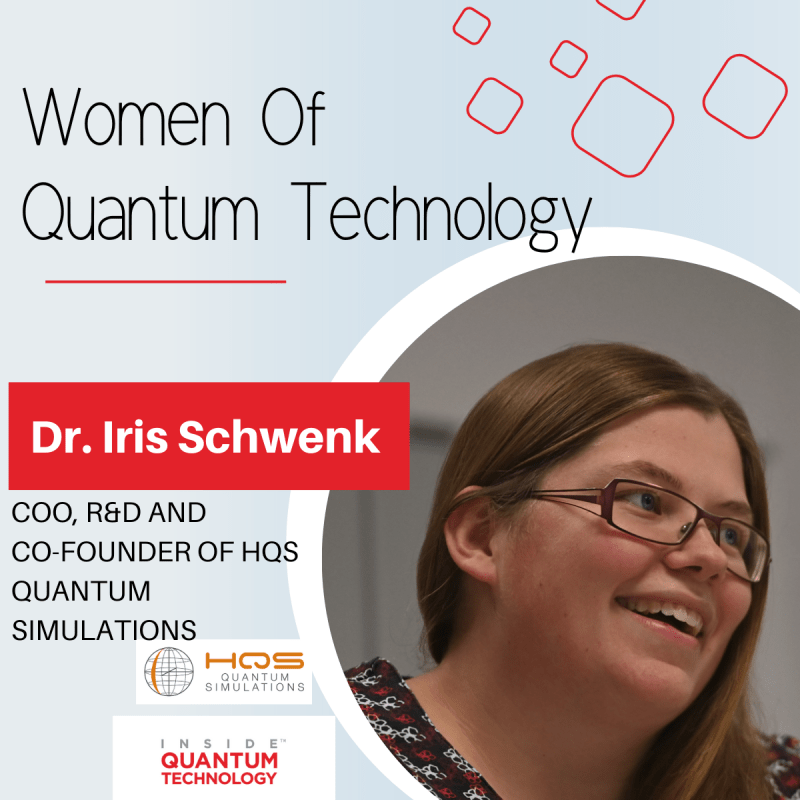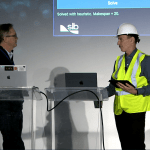Women of Quantum Technology: Dr. Iris Schwenk of HQS Quantum Simulations

The quantum industry gives real-world applications to many different aspects of physics, including theory. For many theorists, like Dr. Iris Schwenk, now the COO and Co-Founder of HQS Quantum Simulations, quantum computing allowed her theory research to have a practical application. As Schwenk explained: “In theoretical physics, which is my field [quantum gave] some kind of practical relevance, where you could see why it is important or why you should care.” Though her research focused on solid-state physics, Schwenk found the mathematics of quantum physics to be fascinating after a professor exposed her to it. “This kind of mathematics behind quantum computing is astonishingly easy in comparison to other stuff you do in solid-state physics,” Schwenk added. “This beauty of the mathematics leads you to very interesting results that are not fitting to our perception of reality – it is so completely different than what you’d expect.” This fascination helped Schwenk and three other physicists from the Karlsruher Institut for Technologie (KIT) to form their own company in HQS Quantum Simulations.
The idea for the company came about when Schwenk was working on her Ph.D. at KIT. “You could feel the interest in quantum,” Schwenk stated. “Google and IBM had already shown that part of the theoretical quantum field could have some kind of practical application.” Schwenk and three other Ph.D. students wanted to take advantage of this growing interest in quantum technology and decided that the best path to take would be to start their own company. “You need a stronger focus and direct communication with industry partners, and this is something that was not possible from our perception within the university,” Schwenk said. Because she was studying on a scholarship, Schwenk had more flexibility in her transition from university to industry, which was especially helpful as her first child was born during this time. With the help of an accelerator program, Schwenk and the others were on their way to making HQS Quantum Simulations possible. “After really founding the company and starting the first project, we moved to the startup accelerator where we had our desks, so we didn’t work in our university offices anymore,” Schwenk added. “There was a clear spirit of: ‘okay, now we founded a company and we’re going to focus on this.'”
Like many other university spin-offs within the quantum industry, the team found that there were many things to learn. As Schwenk said: “We learned very basic, important things that are hard to understand for theoretical physicists like you need to talk to your customer before you are finished with your product. Many scientists, would prefer to sit in their basement and do work for like 10 years until it’s perfect, and then go out and sell it. But then you just completely miss the customer’s needs.” This lesson and a few others, Schwenk believes are important for spin-off companies to learn, otherwise they will get “stuck” in the university system. “I also see founders from a university who get stuck,” she elaborates., “In the end, they do not jump, and they’re not doing the business part. Then there is no money, so then they apply for the next research grant in university and have to work on something else.” Seeing these “stuck” examples, Schwenk and her team made purposeful decisions to build HQS Quantum Simulations into the successful company it is today.
Now as COO, Schwenk finds herself bridging both the technical and business sides of the company. “I’m really interested in the kind of processes we use in the company,” She added. “Not so much in the basic things like managing travel costs, but more the processes of how we organize our technical and scientific work and how everyone knows what our goals are. That is very important for a young and growing company.” While it can be easy for a startup to constrain employees’ work-life balances, Schwenk does her best to make sure this doesn’t happen. “I also try to support our team members,” she said. “I know you have to work, but you also have your life. So, we need to find settings that work for everyone.” As someone who has had to juggle a career and having children, Schwenk tries to help make this as easy as possible for others in the company.
Schwenk also sees this need for allowing work-life balance as a way that the quantum industry can become more inclusive. “A person has a work life, but they also have a private life,” she stated. “If you have kids or even several, or you have to take care of your parents, these are examples of stuff that can happen to many people, so you need to create a space for this. If you’re too strict with your structures at work, people will just leave.” In looking at her own experience with having kids and following her career, she feels grateful for the flexibility and hopes others implement it too. “For other levels of diversity, I think it’s also important to have some kind of open mind and listen to what people need. Often it is not too complicated to take this points into consideration.” Schwenk added.
Kenna Hughes-Castleberry is a staff writer at Inside Quantum Technology and the Science Communicator at JILA (a partnership between the University of Colorado Boulder and NIST). Her writing beats include deep tech, the metaverse, and quantum technology.



















